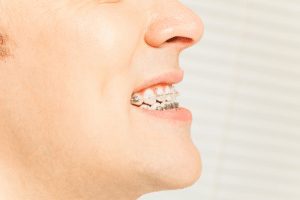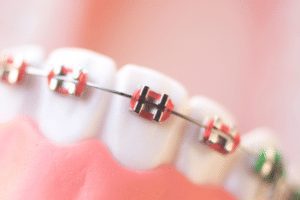3 Types of Bites in Dentistry and Fixes
August 16, 2021Types of Bites in Dentistry
Ever wondered why orthodontics is so important? The answer is simple Orthodontists have many different solutions to the problems that people experience with their teeth. Still, before they can fix anything, they need to know what is causing the problem in the first place! This blog post will look at three different types of bites in dentistry that an orthodontist most often sees: overbite, underbite, and crossbite. We’ll also discuss some of the most common issues associated with each different type of bite’s teeth, including how it affects your gums and jawline, as well as possible treatments for each one.
1. Overbite
Overbite, also known as a deep bite, is characterized by the upper teeth extending beyond the lower teeth when your mouth is closed. This type of bite can lead to many issues such as jaw pain and headaches due to poor diet choices or even stomach acid reflux. Overbites can occur at any age but are most common in teenagers and young adults. This is because as we age, our teeth start to move in different directions and become a little less likely to overlap, which is why an overbite can be so much more common when you are younger (especially if your parents have a similar bite).
Overbites can be corrected with braces or Invisalign, but it’s very important to have the proper diagnosis as a few other types of bites in dentistry may be mistaken for an overbite. Suppose you are seeing a dentist who is inexperienced or not properly trained in orthodontics. In that case, they will likely misdiagnose your bite because it’s so commonly confused with another type of bite. Because of this, it’s important to find an orthodontist who will be able to give you a 100% accurate assessment of your bite and, if necessary, perform treatment on it.
2. Underbite
The main difference between overbite and underbite is that the upper teeth do not extend beyond the lower teeth. An underbite can occur at any age and is often genetic, so you or your parents may have the same bite. Underbites are also a lot more common among men than women, which may be due to some testosterone issues that cause our jawbone to become thicker and stronger in the process.
Underbites are an even bigger problem than overbites because they can lead to issues with your teeth and gums and eating certain foods such as steak. However, depending on the severity of your underbite, you may be able to correct it without braces or Invisalign. An example of this is spacers, which can move your jaw forward and create space between your teeth.
Underbites can be treated with the same methods as an overbite, but your orthodontist will likely need to do some additional open bite treatment (which is where they make your jaw joint a little wider). Jaw surgery may also be recommended if other treatments don’t fully correct the problem.
3. Crossbite
A crossbite is similar to an overbite in that your teeth don’t overlap at all, but there are some key differences. First, a true overbite will have unequal spacing between your upper and lower teeth, so the biting surfaces don’t line up nicely. Second, both sets of teeth line up in a crossbite, but the upper teeth will still overlap.
Crossbites are a little more common with women than men and usually occur in children who have been grinding their teeth (especially a hard or sticky food such as peanut butter). This type of bite can lead to many issues, including crooked teeth, problems with your jaw joint, and headaches, just like an overbite.
For those thinking about getting braces, it’s important to note that braces will not always be able to fix this type of bite. One wrong turn with your teeth can make a crossbite even worse. This is why you need to find a qualified orthodontist who will be able to determine if braces are right for you or if a more invasive procedure is needed.
Other Type of Bites
Reverse Overbite (Mandibular Protrusion)
This is another type of bite in dentistry. A reverse overbite is much less common than the other types of bites mentioned above, but it’s still something that should be taken seriously because it can be very painful. Also, with this type of bite, the lower teeth will stick out past the upper teeth rather than vice versa, like in a normal overbite or crossbite. It’s not clear why some people have a reverse overbite and others do not, but some known risk factors increase your odds of developing one, including:
Malocclusion: Having crooked teeth may make your jaw abnormally shaped, which can cause it to be weaker.
Underbite: This is what a reverse overbite looks like if you have an underbite.
Aging: As people age, their gums tend to recede and expose more of their lower teeth. This makes the situation even worse.
Suppose you have a reverse types of bites in dentistry and are interested in braces. In that case, it’s very important to find a doctor who has experience with this condition because the best treatment options will differ from regular braces. These issues can also be fixed with surgery, but most people don’t do that unless their bite is excruciating or causes other problems like headaches.
Conclusion
In the end, it’s essential to keep in mind that what appears as a structural defect is just your bone structure adapting to where you place pressure on it most frequently. This means that many of these issues can be easily fixed without braces or Invisalign, but it will become harder for your dentist to do so if you wait too long.
It’s also important to remember that the different types of bites teeth you make as a child will influence your bite for the rest of your life, which is why it’s so important to correct these issues early on and get professional help from an orthodontist who has experience with this type of treatment.
Orthodontic Arts, your number one Orthodontist in OKC. Our Certified Orthodontist provides the latest and greatest Orthodontic practices to our clients in the OKC and Midtown area. Orthodontic Arts is the best place for child and teen orthodontics as well as adult orthodontics. Be sure to ask about Invisalign and invisible braces! Contact us today at (405) 604-3745 or request an appointment.

